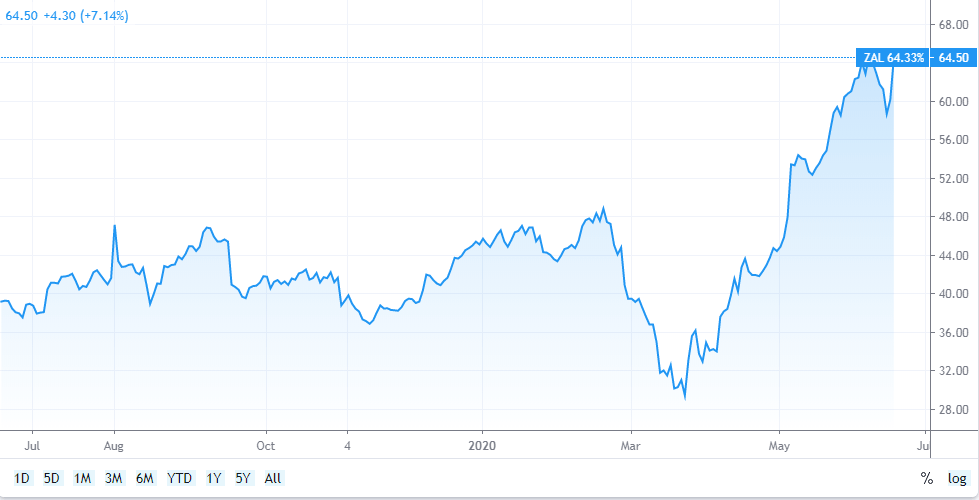You can check out a list of recommended stock brokers if you want to invest in stocks.
It has been another strong week for online fashion retailers as bored locked down shoppers look for ways to treat themselves.
Shares in online retailers Zalando and ASOS registered a spike on Thursday after the company announced it expects a big increase in second-quarter sales and operating profit due to shopping during the coronavirus lockdowns.
The sales of online retailers are expected to triple this year, accounting for 23% of European sales in 2020, levels not expected before 2024 prior to the pandemic, analysts at Bernstein said, adding the market share could reach 37% by 2030.
“The sudden closure of all apparel retail stores across all major global markets has disrupted the sector in an unprecedented way this year,” said Bernstein’s Aneesha Sherman. “[It’s] five years’ worth of growth achieved in about six months.”
Zalando, Europe’s biggest online-only fashion retailer is on track to beat market expectations of 16% second-quarter revenue growth and an adjusted operating profit of €104m ($117m).
After news of the online retailer’s performance broke out, Zalando’s shares were up 5.7% on Thursday morning, bringing their year-to-date gain to more than 40%. The stock is more than 7% higher this week.
British rival ASOS also saw a 5%, rise in the value of its shares on Wednesday when it said it would top market expectations this year after a 45% rise in first-quarter revenue. ASOS stock is up around 17% this week.
And these are just two in a long line of online retailers that have been reporting stronger-than-expected sales figures over the past quarter.
Inditex, the world’s biggest fashion retailer, which owns Zara, expects online sales to make up a quarter of its sales by 2022, compared to 14% currently, after a 95% surge in lockdown conditions in April. The stock is up 2.5% this week.
H&M reported on Monday its group sales halved from March to May and were down 30% but for the same period, but online sales jumped 36% over the same period. The stock is just under 3% higher this week.
However, it is not all doom and gloom for brick-and-mortar high street stores. Discount fashion retailer Primark, owned by Associated British Foods (ABF), emerged among the winners post-lockdown as noo-essential shops reopened in England on Monday. As of June, 112 Primark stores are currently open, accounting for 34% of total store space, as lockdown restrictions ease in Europe. This led to a 3.8% rise in the retailer’s share price following the announcement. ABF stock is up more than 5% this week.
Despite tougher social distancing guidelines and the majority of brick-and-mortar retailers still remaining closed, a good segment of the population continues to prefer shopping in-person to online retailers.
“Stores will also offer a much-needed outlet for discretionary time, money, and social interaction this year. All the other usual alternatives will remain largely off the table for a little while longer,” Bernstein’s Aneesha Sherman wrote.
Trusted & Regulated Stock & CFD Brokers
What we like
- 0% Fees on Stocks
- 5000+ Stocks, ETFs and other Markets
- Accepts Paypal Deposits
Min Deposit
$200
Charge per Trade
Zero Commission on real stocks
64 traders signed up today
Visit Now67% of retail investor accounts lose money when trading CFDs with this provider. You should consider whether you can afford to take the high risk of losing your money.
Available Assets
- Total Number of Stocks & Shares5000+
- US Stocks
- German Stocks
- UK Stocks
- European
- ETF Stocks
- IPO
- Funds
- Bonds
- Options
- Futures
- CFDs
- Crypto
Charge per Trade
- FTSE 100 Zero Commission
- NASDAQ Zero Commission
- DAX Zero Commission
- Facebook Zero Commission
- Alphabet Zero Commission
- Tesla Zero Commission
- Apple Zero Commission
- Microsoft Zero Commission
Deposit Method
- Wire Transfer
- Credit Cards
- Bank Account
- Paypall
- Skrill
- Neteller
What we like
- Sign up today and get $5 free
- Fractals Available
- Paypal Available
Min Deposit
$0
Charge per Trade
$1 to $9 PCM
Visit Now
Investing in financial markets carries risk, you have the potential to lose your total investment.
Available Assets
- Total Number of Shares999
- US Stocks
- German Stocks
- UK Stocks
- European Stocks
- EFTs
- IPOs
- Funds
- Bonds
- Options
- Futures
- CFDs
- Crypto
Charge per Trade
- FTSE 100 $1 - $9 per month
- NASDAQ $1 - $9 per month
- DAX $1 - $9 per month
- Facebook $1 - $9 per month
- Alphabet $1 - $9 per month
- Telsa $1 - $9 per month
- Apple $1 - $9 per month
- Microsoft $1 - $9 per month
Deposit Method
- Wire Transfer
- Credit Cards
- Bank Account





